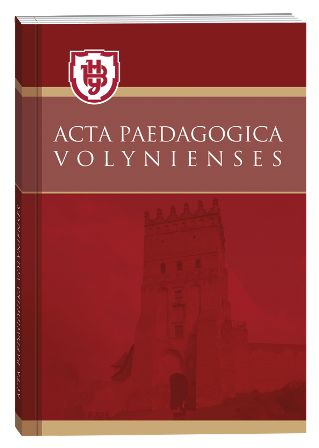FEATURES OF THE FORMATION OF IDEAS ABOUT THE VARIABLE AT THE INITIAL STAGE OF MATHEMATICS STUDY
DOI:
https://doi.org/10.32782/apv/2023.1.13Keywords:
variable, mathematical expression, letter symbols, equation, inequality, functional dependenceAbstract
The state of development of the problem of the formation and development of pupils’ ideas about a variable in the process of studying the elementary course of mathematics has been clarified. The mathematics program envisages the use of concepts related to the concept of a variable, which will allow more fully and effectively to reveal arithmetical concepts, to prove certain generalizations that are formed in primary school. This, in turn, creates prerequisites for successful study of the algebra course. The concept of a variable is a higher degree of generalization and abstraction and requires continuous purposeful training of primary school pupils. Methodological features and didactic conditions for studying concepts related to variables by junior high school students in the process of learning mathematics are highlighted. The main directions of the development of the concept of variable in the elementary course of mathematics are analyzed. Acquaintance of primary school pupils with numerical expressions and expressions with a variable, the use of letter symbols when solving plot problems are important components of the method of forming ideas about a variable in primary grades. Learning of equations and inequalities by schoolchildren on the basis of a single approach to their solution in the primary course of mathematics will not only ensure continuity in learning, but will also optimally implement internal and inter-subject connections in these issues, increase the quality of learning, and save pupil’s learning time. Solving story problems using equations is based on certain abilities and skills of pupils, which are provided by the mathematics program for primary school. These include skills and abilities: to solve equations based on the relationship between components and the results of arithmetic operations; read and compose expressions; solve problems by composing numerical and letter expressions; understanding of the functional dependence between quantities. Tasks that contain a variable and related concepts form a fairly large volume of mathematical educational material in secondary school. They are essential in the process of establishing the connection between the teaching of mathematics and other disciplines. Therefore, it is worth increasing attention to the formation of concepts related to the variable already from the first years of children’s education.
References
Богданович М.В., Козак М.В., Король Я.А. Методика викладання математики в початкових класах / Тернопіль : Навчальна книга – Богдан, 2016. 368 с.
Гаврилюк А. Прості задачі як засіб формування математичної компетентності в початковій школі / Початкова школа. 2016. № 1. С. 17–19.
Ілінов Б. Про вивчення у початковій школі залежності результату арифметичних дій від зміни одного з компонентів / Початкова школа. 2010. № 6. С. 24–30.
Коваль Л.В., Скворцова С.О. Методика навчання математики : теорія і практика. Підручник. Частина І. / Одеса : Автограф, 2008. 284 с.
Король Я.А., Романишин І.Я. Початкова школа. Методика роботи над матеріалом алгебраїчної пропедевтики. 1-4 класи / Тернопіль : Астон, 2003. 240 с.
Мироновська Л. Робота над типовими і нетиповими задачами в 3-4 класах / Початкова школа. 2010. № 5. С. 21–24.
Митник О.Я. Як навчити дитину мистецтва мислення / Київ : Початкова школа, 2006. 104с.
Назаренко Н. Розв’язання текстових задач алгебраїчним способом / Початкова школа. 2011. № 2. С. 25–27.
Співак Г. Знаходження невідомого числа. Розв’язування нерівностей і рівнянь у 1 класі / Початкова школа. 2012. № 3. С. 58–61.
Фурман А.В. Оптимізація розумового розвитку школярів : психологічний аспект / Початкова школа. 2004. № 9. С.51–58.







